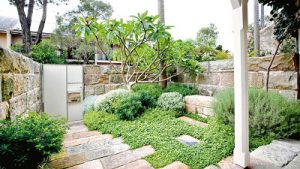How to Save Money on a Garden Overhaul
It’s possible to accomplish an inexpensive garden redesign as long as there’s a plan.
When designing cost-effective landscaping for a home or property, it’s important to have a solid grasp on what’s wanted and desired. Is the overall goal to save money, to add aesthetic value, to add monetary value and appeal to your property, or perhaps, all of the above?
Getting the correct skip bin for your garden or soil waste is important. Check out our easy-to-follow Waste Types Guide.
All the information is available in this downloadable Backyard Landscaping Guide eBook.
To begin with, every backyard design:
1/. Must add value. When working with any new backyard design, especially a cheap backyard design, keep in mind that it needs to add real value to a home and property. Improved landscaping may boost a home’s value considerably. It may even be possible to recoup the entire cost, or even double the landscaping cost when it’s time to sell.
Another enticing advantage of using garden redesigns to add property value is that it can also save you money in the long term. It’s possible to reduce a home’s water bill, air conditioning and heating costs by using trees, shrubs and drought-resistant plants to:
- Block wind
- Offer shade
- Cut down on water consumption
2/. Must be manageable
Cheap landscaping ideas don’t have to be ordinary, but they must be manageable. It’s therefore important to understand how much time is involved in caring for the new landscape in the future.
If there’s not the time for a lot of upkeep, consider plants, trees and landscaping that don’t need a lot of extra care. No matter the design, though, every garden needs at least a small amount of upkeep and attention. Typically, a simple garden requires occasional weeding and trimming back shrubbery. Our Garden Green Waste Guide is useful to read.
3/. Must compliment home/property design
When scouring any cost-effective garden ideas, consider options that complement a property’s overall design. A new garden may be solely functional, aesthetic or both. Choose complementary or contrasting colours and products that highlight the best attributes of a property.
4/. Save money by planning it out. Adding new landscaping features can quickly escalate in price. However, planning helps.
5/. Designate a space. A small space likely costs less but not always. Consider whether to go with a lush corner garden or a larger space with a blend of inexpensive landscaping ideas.
6/. Take inventory. Think about any trees or landscaping that can be repurposed and the things that you will just have to work around in the garden. This is also a good time to gather common supplies and plan for things like affordable bins to dispose of existing garden waste.
7/. Come up with a design. Whether a single colour or mix of colours, a mix of materials or just a couple of key stand out items, a design should fit the space and a homeowner’s needs.
8/. Divide up the work. A plan also includes understanding the amount of work that’s needed, and it is also worth highlighting the projects key priorities. Not having a plan is one of the biggest mistakes, but there are others.
Costly mistakes to avoid
Lack of a budget
It doesn’t matter how many cheap landscaping ideas are introduced if there’s not a budget to help visualize a finished project. By setting a budget you will also ensure that the costs don’t blow out by the time you are done with the design.
The wrong landscaping
Other things that can drive up the cost of a garden redesign include selecting the wrong plants and trees. Non-native plants and trees typically won’t grow as easily and often necessitating more care.
It’s also important to ensure that the plants you select will not cause other structural issues. For instance; planting a large tree species in a small backyard garden can cause major issues, due to these trees having complex root structures and occasionally may even have buttress roots that can disrupt topsoil. These can have widespread effects including (but not limited to) harming other plants in your garden, limiting your landscapes space and damaging your plumbing.
Planting too close
Another major mistake is planting large plants and trees too close to a home or fence, as some have wide, deep roots and could cause problems later.
Not understanding annuals vs. perennials
Yet another potentially costly mistake is not taking into account the difference between annuals and perennials.
- Perennials: May cost more upfront but return every year
- Annuals: May cost less but have to be replaced every season
Choose native plants/grasses/trees
Native plants, withstand the elements better, and in most cases can help you save money in terms of upkeep.
Local gardening groups and suppliers can help in terms of recommending the specific types of grass you should look at for your redesign. However, popular grasses in Australia include:
- Zoysia
- Kikuyu
- Buffalo
Our Backyard Landscaping Guide eBook is available now as a download.
Read more Garden and Landscaping Tips on our blog page:
Archives
- July 2024
- May 2024
- October 2023
- September 2023
- March 2023
- February 2023
- September 2022
- August 2022
- July 2022
- June 2022
- May 2022
- April 2022
- February 2022
- January 2022
- December 2021
- November 2021
- October 2021
- September 2021
- August 2021
- July 2021
- June 2021
- May 2021
- April 2021
- March 2021
- February 2021
- January 2021
- December 2020
- November 2020
- October 2020
- September 2020
- August 2020
- July 2020
- June 2020
- May 2020
- March 2020
- February 2020
- January 2020
- December 2019
- November 2019
- October 2019
- July 2019
- April 2019
- March 2019
- February 2019
- September 2018
- June 2018
- February 2017


